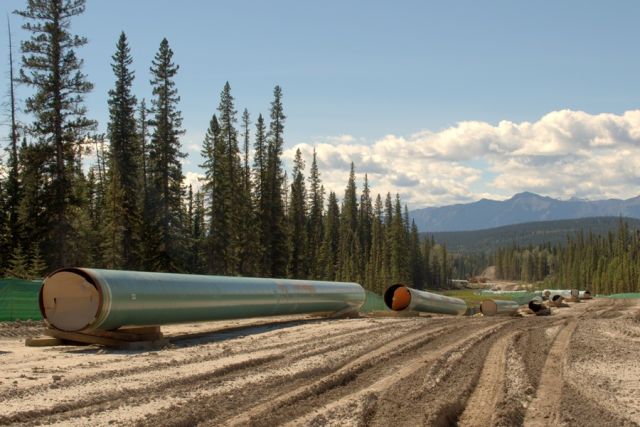
The Trans Mountain Pipeline under construction along the eastern slopes of the Rocky Mountains. (Source: Shutterstock.com)
The Trans Mountain Pipeline expansion (TMX) is scheduled to start moving oil from Alberta to Canada’s West Coast on May 1.
The Canadian government, builder and current owner of TMX, hopes the next major move for the line is a transfer of the pipeline’s ownership out of government hands. But timing, price and eventual buyers remain up in the air.
Since buying the line from Kinder Morgan in 2018 for CA$4.5 billion (US$3.28 billion), the government has promised to sell the TMX once it was completed. The government set up a crown corporation, a government-owned entity acting like a private company to oversee the project.
The Trans Mountain Pipeline expansion project will almost triple the crude line’s capacity to 590,000 bbl/d. The line will be the first in decades that offers Canadian producers large-scale access to international markets, such as Korea and China, without first shipping through the U.S.
However, construction costs exploded, going from the original estimate of CA$7.4 billion to CA$34 billion by 2024. The Canadian government will most likely be forced to sell the expanded line without making back the costs of construction, analysts said.
“The construction price is not relevant to the likely ultimate purchase price,” Hinds Howard, portfolio manager for CBRE, wrote in an email. “Valuation will depend on the cash flow of the pipeline.”
In November 2023, the Commission of the Canada Energy Regulator approved preliminary interim tolls for the pipeline at $11.46/bbl. The price is considered high for the transport of crude—and also low to pay off the construction costs. An eventual sale of TMX may include more tariff negotiations, adding to the time it takes to arrive at a deal, said Sunil Sibal, managing director and senior analyst of Seaport Global.
“I would expect a finalization of sale would require a finalization of the tariffs,” Sibal told Hart Energy. “It is likely that the sale of TMX would come at a loss—due to significant runup in construction cost. So this is going to be a contentious issue for sure.”
The pipeline buyers will also be expected to share a stake with the indigenous groups located along the TMX’s path, as announced by Canadian Finance Minister Chrystia Freeland in August. Including indigenous groups was a product of the political realities that faced construction of the line from Alberta through British Columbia.
“I wouldn't be surprised if they sold a small stake to indigenous tribes—that is a trend we have been seeing,” Ajay Bakshani, East Daley Analytics director of midstream company financials, wrote in an email. Bakshani pointed out that Canada-based Enbridge sold a stake in its oil sands to Canadian indigenous tribes in 2022. Midstream company Pembina is partnering with indigenous tribes on the Cedar LNG project on the Canadian West Coast.
Bakshani said he also expected the eventual ownership of the line would be primarily Canadian.
“For non-Canadian midstream companies, the asset would not really fit in given the lack of exposure to (the Western Canadian Sedimentary Basin), so there's not that many commercial synergy opportunities,” he said.
Several analysts said Pembina may be the company to watch lead an ownership deal, though full ownership of the pipeline is unlikely.
“Pembina is going through the process but has indicated publicly they don’t intend to purchase the whole pipeline,” Howard said. “They will be very price sensitive in the process, maintaining discipline if the required price were too high.”
Recommended Reading
Hess Corp. Bucks E&P Trend, Grows Bakken Production by 7%
2025-01-29 - Hess Corp. “continues to make the most of its independent status,” delivering earnings driven by higher crude production and lower operating costs, an analyst said.
Chevron to Lay Off 15% to 20% of Global Workforce
2025-02-12 - At the end of 2023, Chevron employed 40,212 people across its operations. A layoff of 20% of total employees would be about 8,000 people.
Chevron Names Laura Lane as VP, Chief Corporate Affairs Officer
2025-01-13 - Laura Lane will succeed Al Williams in overseeing Chevron Corp.’s government affairs, communication and social investment activities.
Murphy Shares Drop on 4Q Miss, but ’25 Plans Show Promise
2025-02-02 - Murphy Oil’s fourth-quarter 2024 output missed analysts’ expectations, but analysts see upside with a robust Eagle Ford Shale drilling program and the international E&P’s discovery offshore Vietnam.
BP Cuts Renewable Investment, Boosts Oil and Gas in Strategy Shift
2025-02-26 - BP aims to grow oil and gas production to between 2.3 MMboe/d and 2.5 MMboe/d in 2030.
Comments
Add new comment
This conversation is moderated according to Hart Energy community rules. Please read the rules before joining the discussion. If you’re experiencing any technical problems, please contact our customer care team.




